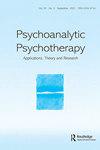大群体心理学:种族主义,社会分裂,自恋的领导者和我们现在是谁
IF 1.2
Q1 PSYCHOLOGY, PSYCHOANALYSIS
引用次数: 6
摘要
我被这本书所吸引,因为我对这些主题有着长期的兴趣。鉴于最近发生的令人不安的世界事件,这个大胆的标题显得特别及时、令人心酸和切合实际。乔治·弗洛伊德被谋杀,随之而来的“黑人的命也是命”运动,新冠肺炎对大型团体动态的影响,以及英国脱欧。在疫情期间,我曾担任过多个团体关系会议的教员,并看到基于种族、阶级、性别和许多其他分歧的排斥或敌意等强大而痛苦的主题在这种背景下越来越多地出现。自从同意阅读这本书以来,乌克兰爆发了战争,上述事件的总和,以及我在国家卫生系统担任精神病学家的生活经历,以及在此期间为私营部门的国家和国际团体提供咨询,这让我更加好奇,我们如何理解潜在的动力,并理解我们现在是谁和在哪里。作为一名在英国成长为第二代移民的英裔亚洲人,我一直对群体感兴趣,以及他们如何对“他人”的威胁表现出集体无意识的幻想。我很喜欢沃尔坎是如何开始这本书的,他如此公开地分享自己的背景和故事,以揭示理论内容,并引用他自己叙述中任何可能的盲点。这本书继续讲述了许多美丽而简单的叙述经历和事件的例子,我在阅读文本时很容易将其想象和感受到。这使我作为一名读者能够真正将自己置于一种投入和学习的心态中。每个标题下的简短部分意味着该理论可以在现实数据的背景下理解;简单的隐喻,比如我们作为一个群体创建的“帐篷”,并没有保持抽象,而是帮助复杂的理论产生共鸣并落地。当沃尔坎逐渐描述与事件相关的意义时,读者感觉自己被引导、被抓住了。宣传及其起源、理性行动者-领导者之间的差异(他们没有考虑到无意识的过程)和危险等概念本文章由计算机程序翻译,如有差异,请以英文原文为准。
Large-group psychology: racism, societal divisions, narcissistic leaders and who we are now
I was drawn to this book given a longstanding interest in the themes. The bold title felt particularly timely, poignant and relevant given disturbing recent world events. The murder of George Floyd, the ensuing Black Lives Matter movement, the impact of COVID-19 upon large group dynamics, and Brexit. Over the pandemic period I have been faculty for a number of Group Relations Conferences and have seen powerful and painful themes of exclusion or hostility based upon race, class, gender and many other divides increasingly played out in this context. Since agreeing to review this book, war has broken out in Ukraine and the sum of the above events and my lived experience of working as a psychiatrist in the state health system, as well as consulting to both national and international groups in private sectors during this period, have made me even more curious as to how we may understand the underlying dynamics and make sense of who and where we are now. As a British-Asian growing up as a second generation immigrant in the United Kingdom I have always been interested in groups and how they act out collective unconscious phantasies towards the threat of ‘the other’. I enjoyed how Volkan started this book by sharing his own context and story so openly to bring the theoretical content to light and reference any possible blind spots in his own accounts. The book continued with many beautifully and simply described narrative experiences and examples of events that I was easily able to visualise and feel whilst reading the text. This enabled me as a reader to truly place myself in an engaged and learning state of mind. The brief sections under each headline meant the theory could be understood in the context of real-life data; rather than remaining abstract, Simple metaphors such as ‘the tent’ we create as a group helped complex theory to resonate and land. The reader feels guided, hand-held through the steps of Volkan’s thoughts as he gradually describes meanings related to events. Concepts such as propaganda and its origins, the differences between rational actor leaders (who factor in no unconscious process) and the dangers
求助全文
通过发布文献求助,成功后即可免费获取论文全文。
去求助
来源期刊

Psychoanalytic Psychotherapy
PSYCHOLOGY, PSYCHOANALYSIS-
CiteScore
1.30
自引率
37.50%
发文量
22
期刊介绍:
Psychoanalytic Psychotherapy publishes original contributions on the application, development and evaluation of psychoanalytic ideas and therapeutic interventions in the public health sector and other related applied settings. The Journal aims to promote theoretical and applied developments that are underpinned by a psychoanalytic understanding of the mind. Its aims are consonant with those of the Association for Psychoanalytic Psychotherapy in the NHS (APP in the NHS) in promoting applied psychoanalytic work and thinking in the health care system, across the whole age range.
 求助内容:
求助内容: 应助结果提醒方式:
应助结果提醒方式:


